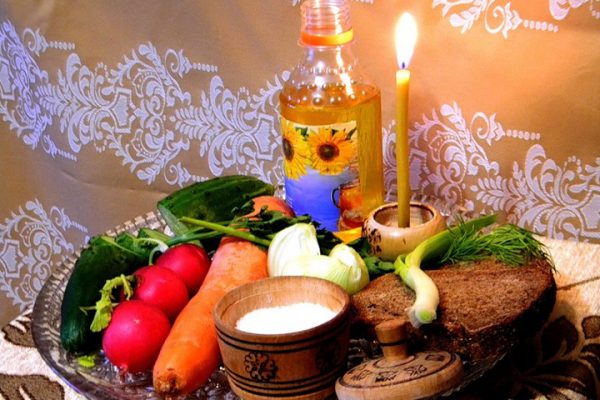It’s time to talk about Fasting.
This coming Sunday is popularly called “Meatfare Sunday”, the last day for meat till Pascha. Beginning next Monday we get serious about fasting. Why does meat go off before Lent begins? Because the Orthodox Church leads us into all things gently. No instant salvation here. Likewise, there’s no instant Lent, as you see. In the same way we also ease out of the Paschal feast. There is no fasting during Bright Week – and in the Antiochian tradition (and some others?) a full forty days without fasting.
So we approach the Great Lenten Fast gradually. Last week was fast-free: the Church pulls us back from fasting before we begin. (Sorry if you missed it. Come back next year.) This week we have returned to the usual Wednesday/Friday meatfast. On Meatfare Sunday we take our next step. Some churches have a great “meatfeast”, when we bring meat to church to devour at coffee hour. “Gather ye bratwursts while ye may.” (That’s a local Wisconsin sausage, if you didn’t know.) Then in a week Lent is here, and it’s roots and berries till Pascha. Well, not really.
Let’s talk about the purpose of Fasting, starting with this Sunday’s Epistle and Gospel readings.
Epistle: I Corinthians 8:8 – 9:2 With all our emphasis on Lenten fasting, why ever do you suppose the Church Fathers chose this Epistle for today? in which Saint Paul says, “Food does not commend us to God” one way or the other. God isn’t impressed whether we eat or don’t eat – hardly designed to encourage us to fast!
Here’s the explanation. Our Orthodox lectionary has changed very little since Patristic times. The Fathers were aiming these Pre-Lenten readings to a society where almost everybody fasted.
In fact, almost everywhere in the world at every time in every culture in every religion, people have practiced religious fasting. That is, up until modern times in our culture where most people think fasting for spiritual reasons is just silly. For physical health, yes. For spiritual health, no way.
How very odd. For in recent times we have learned again to think holistically, to see the inter-connectedness of soul, mind and body. So why do so few people now see the connection between spiritual health and what we do with our bodies – regarding fasting, and far more important things such as sexual morality, in the Epistle for the Second Sunday of Pre-Lent: 1 Corinthians 6:12-20 But that’s our modern world: disjointed and inconsistent.
Anyway, today’s Epistle was directed at people who took fasting for granted – as I think, I hope, most Orthodox people still do – and were tempted to over-emphasize it. The Fathers’ purpose was to point out the dangers in fasting, of thinking that if we fast God will be impressed: “Wow!” he will say, “he didn’t eat that hot dog! What a wonderful holy person he is!” I don’t think so. They are warning us that merely fasting from food does not make for a good Lent.
Also to understand the Epistle we need to read it in its First Century context. At that time animals were sacrificed in pagan temples, then the meat was sold in the markets. The question was: should Christians eat such meat or not? Some said no, the meat was “spiritually contaminated”. Others, including Paul, thought it was ok, since idols have no real existence. However, Paul thought both opinions were acceptable, which is why he said it doesn’t matter whether you eat it or don’t eat it.
How does your Fasting or not Fasting affect others?
This led to the Fathers’ warning for us, one we rarely think about: “Beware lest somehow this liberty of yours become a stumbling block to those who are weak.” This is the real issue. The greatest virtue is not fasting but love, caring about people.
Let’s start on the surface level:
Once I took a guy who was considering Orthodoxy out to lunch, so we could  talk. Among other things, we talked about the Wednesday/Friday meatfast. I finished the last bite of my pepperoni pizza. (I’m putting an image of it here so I can drool over it during Lent.) He departed. Then I realized it was Wednesday. He didn’t say a thing about it, but I never saw him again, and I’ve always wondered if that was why – he decided I was faking it. What if someone weak in faith or new to Orthodoxy sees you eating a cheeseburger during Lent and concludes these Orthodox are only playing games. In fact that did happen to me a few times when I was a neophyte Orthodox, but I got past it.
talk. Among other things, we talked about the Wednesday/Friday meatfast. I finished the last bite of my pepperoni pizza. (I’m putting an image of it here so I can drool over it during Lent.) He departed. Then I realized it was Wednesday. He didn’t say a thing about it, but I never saw him again, and I’ve always wondered if that was why – he decided I was faking it. What if someone weak in faith or new to Orthodoxy sees you eating a cheeseburger during Lent and concludes these Orthodox are only playing games. In fact that did happen to me a few times when I was a neophyte Orthodox, but I got past it.
Or take the opposite tack: What if you fast in a prideful way? You’re invited out to a non-Orthodox friend’s house during Lent, and they serve you meat. “Oh, I can’t eat that. I’m Orthodox. I’m fasting!”- and your host concludes Orthodox are self-righteous ungrateful prigs.
 Once during Lent Saint Spyridon (d. 348) had an unexpected visitor, a man who had come a long way and was famished. Spyridon ate almost nothing during Lent and had no food around except some old dried salted pork. He offered the man the pork. He refused it: it was Lent. So Spyridon during Lent ate some meat first, so the man would feel comfortable. Then the visitor ate.
Once during Lent Saint Spyridon (d. 348) had an unexpected visitor, a man who had come a long way and was famished. Spyridon ate almost nothing during Lent and had no food around except some old dried salted pork. He offered the man the pork. He refused it: it was Lent. So Spyridon during Lent ate some meat first, so the man would feel comfortable. Then the visitor ate.
Paul concluded, “Therefore if [my eating] food makes my brother stumble, I will never again eat meat.” That’s the point. Christian morality is not about food. It’s about people.
Now we need to go deeper about how our fasting or not fasting may affect people.
What Christ said about Fasting
Very little, actually, but what he said was significant.
Jesus told the Apostles that the way to cast out evil, to gain spiritual strength is “through prayer and fasting.” Matthew 17:19-21 Prayer and fasting are medicine to help cure spiritual sickness and make us strong and healthy.
Now, everything we do affects others. My good health, my vision and my ability to get around, depends on my taking daily meds. If I don’t take them and get seriously ill, it would affect not only me; it would put a burden on my wife and family, and on Father David whom I could no longer assist.
Just so with my spiritual health. If I don’t pray, don’t fast, that is not just my business. It pulls everybody down, the whole Church, the entire Body of Christ, indeed the whole world. Whatever you do, think first how it may affect others. Because, brothers and sisters, we are all in this together. John Donne wrote: “No man is an island complete in itself. Each is a piece of the continent, a part of the whole. If a clod is washed away by the sea Europe is the less. Each man’s death diminishes me, for I am involved in mankind. Therefore send not to know for whom the bell tolls: it tolls for thee.”
But fasting seems such a little thing. Why do we put so much emphasis on it? Here was Christ’s teaching about little things: He criticized the Pharisees for keeping little rules (tithing on cooking herbs and the like) but ignoring the great things: mercy, justice, faith. But then he concluded: “You ought to do the one without neglecting the other.” Matthew 23:23 “Whoever can be trusted with very little can also be trusted with much.” Luke 16:10 Love people andkeep the Fast. Why do some people think these are mutually exclusive?
What Christ did not say about Fasting is also significant. Fasting was part of Judaism, and the Lord did not condemn it (as he might have) but rather seemed to take it for granted. In the Gospel for the Sunday before Lent he said not “if you fast” but “when you fast”, and also spoke of some dangers of fasting. We’ll say more about that next week.
Building on this foundation, the Church also took fasting for granted. Its value was obvious, and quickly a system for fasting was developed. When some Christians later made fasting into a legal moral issue, it became something of an idol. (For example, when some considered eating meat on Friday to be a mortal sin which, if not confessed, would send a person to hell.) But when fasting has been used simply as a means for spiritual growth, it has remained a good and useful thing.
Some General Advice about Fasting
 Try to keep the Fast with the Church, but don’t feel you must be rigid about it. The Orthodox Church gives us fasting rules, not fasting laws. If fasting is new to you, work into it gradually over the years. Make sure you get your protein and calcium. Feel free to make necessary adjustments: for age whether young or old. (My 80 year old stomach can’t quite handle the full fast any more.) Make allowance for pregnancy, travel, family situations, health. Don’t make yourself sick, as young John Chrysostom did, by overdoing it. It’s between you and God. I promise, we do not send the fasting police out to look in your window during meals.
Try to keep the Fast with the Church, but don’t feel you must be rigid about it. The Orthodox Church gives us fasting rules, not fasting laws. If fasting is new to you, work into it gradually over the years. Make sure you get your protein and calcium. Feel free to make necessary adjustments: for age whether young or old. (My 80 year old stomach can’t quite handle the full fast any more.) Make allowance for pregnancy, travel, family situations, health. Don’t make yourself sick, as young John Chrysostom did, by overdoing it. It’s between you and God. I promise, we do not send the fasting police out to look in your window during meals.
We’ll say more about Fasting next week. But if you want far better advice on fasting, stop reading this Blog and see what Saint John Chrysostom wrote, after he got older and wised up here.
Moving on, this Sunday is also called
The Sunday of the Last Judgment

Matthew 25:31-46: “When the Son of Man gathers all nations before him he will separate them as a shepherd separates sheep from goats.” It will be the time for the Final Judgment.
Thank God there will be judgment. Do we want the world to go on like this forever? where evildoers so often get away with it? where good people are oppressed, persecuted, suffer?
Saint Basil’s Divine Liturgy, which we use on Lenten Sundays, tells us “He will come to render to each according to His works.” (Don’t tell the Protestants!) How we act now will have eternal consequences.
Christ taught that in the End there will be only two options: Heaven or Hell. There is a Kingdom prepared for the sheep of his flock, with abundant unending life, fresh pastures, an eternal spring, joy with the Lord and all who love him. As for the rebellious goats: “Depart into the everlasting fire prepared for the devil and his angels”.
Eleven times in the Gospels, Christ warned of the fire of “Gehenna”. He was referring to the the valley of Gehenna below Jerusalem (circled) – the city garbage dump, from which smoke was always rising as the  refuse was destroyed. Hell is the eternal garbage dump for those who proved finally to be worthless, not worth saving. (That, in the most basic sense, is what “being saved” means: “not being thrown out” in the Final Housecleaning.) In the End, for you and for me, it will be eternal Joy above in the Holy City with Jesus, or unending destruction down below.
refuse was destroyed. Hell is the eternal garbage dump for those who proved finally to be worthless, not worth saving. (That, in the most basic sense, is what “being saved” means: “not being thrown out” in the Final Housecleaning.) In the End, for you and for me, it will be eternal Joy above in the Holy City with Jesus, or unending destruction down below.
We must believe in the existence of Hell. Christ taught it plainly many times. But, as someone said, we are not required to believe anybody is in it! It is hard to imagine how anyone could finally stand before Jesus Christ, look God in the face, see his beauty, his love, his mercy, his goodness – and reject him. Saint Gregory of Nyssa hoped that in the end everyone, even the devil and his angels, may be redeemed. I like that. But I think the Scriptures teach that while Satan could be redeemed, he won’t be. He will reject it.
For God doesn’t force Heaven on us. Where we finally go is our choice. We are deciding now, and at the End Jesus Christ who knows all, who sees into the hearts of all, will know whether we chose right or wrong. C.S. Lewis wrote (in The Great Divorce) that in the End either we will say to God, “Thy will be done”, or He will reluctantly say to us, “your will be done”. If you don’t want Me, you won’t have Me.
 Jesus Christ will be the Judge of it all. This is his consistent teaching: John 5:22-27 And here is the standard of judgment: “If you did it to the least of these my brethren, you did it to me..… If you failed to do it to the least of these my brethren, you failed to do it to me.” The sick, the lonely, the poor, the helpless, the hopeless, the abandoned ones, refugees, the children of refugees, so many people, so many kinds of needs.
Jesus Christ will be the Judge of it all. This is his consistent teaching: John 5:22-27 And here is the standard of judgment: “If you did it to the least of these my brethren, you did it to me..… If you failed to do it to the least of these my brethren, you failed to do it to me.” The sick, the lonely, the poor, the helpless, the hopeless, the abandoned ones, refugees, the children of refugees, so many people, so many kinds of needs.
And not just needy people “over there”, but the needs of people near us – husbands, wives, children, family, friends, coworkers, the people who stand beside us in church, even bosses, clergy, bishops. Sometimes it’s the ones close to us that we miss. And often what’s asked of us is not difficult. Maybe all they need is a smile or a kind word. But how easily we pass by. The judgment on the wicked will be on what they did not do – sins of omission, They failed to love, to care.
Now, listen very carefully…
…because many Christians completely miss this:
This parable teaches very clearly that the Judgment will not be on whether you “got saved” or had a “born-again” experience or publicly “gave your life to Jesus”. These are man-made doctrines. Nor does your salvation depend on whether you believed the right doctrines, or what church you belonged to, nor even on what religion you belonged to or whether you had any formal religion at all. Christ teaches here that all that will get straightened out in the End, when all will see Christ face to face and know who he is.
 For the parable describes the Judgment of the “Nations”, all people, Gentiles, non-believers.
For the parable describes the Judgment of the “Nations”, all people, Gentiles, non-believers.
And our Lord Jesus Christ teaches here that in the End it will turn out that many non-Christians had been serving him, but just didn’t know it yet – and in they will come. There will be others, “fake” Christians who were not serving Christ – for how could they have been following Jesus and then treat people like that? Did they never listen to what he said about being merciful and generous and compassionate, about loving our enemies, doing good even to those who persecute us? And out they will go.
As Christ often said, in the End “many who were first will be last, and the last first”. But this is not for us to judge. He is the Judge.
But, but… does this mean, then, that Christian doctrine has nothing to do with our salvation? Yes. indeed it does – but no, it doesn’t. For true Christian doctrine is that we are saved by love, not by doctrine.

















